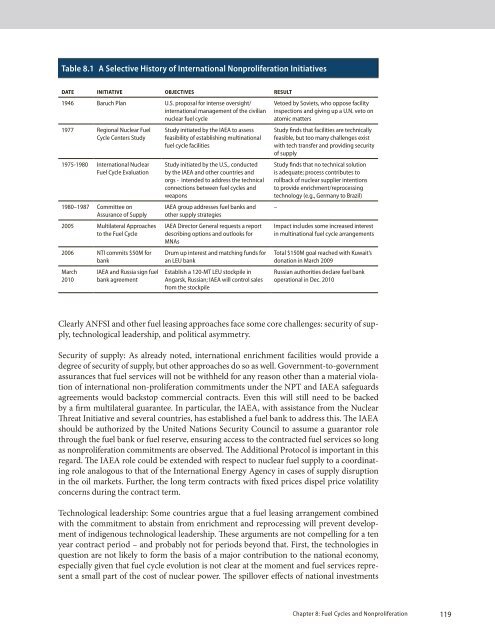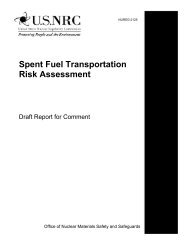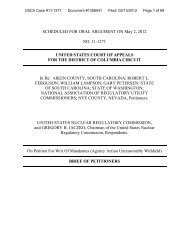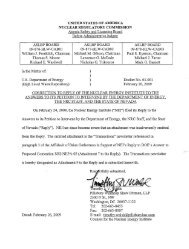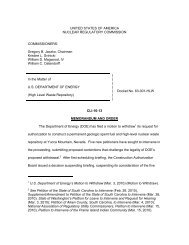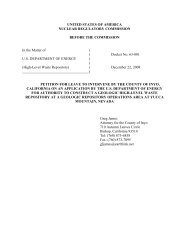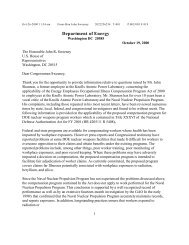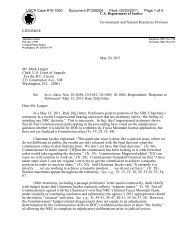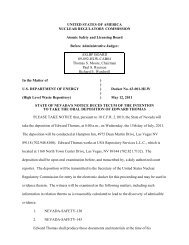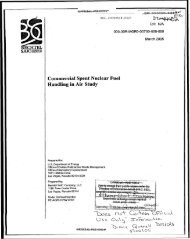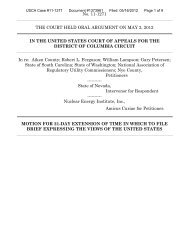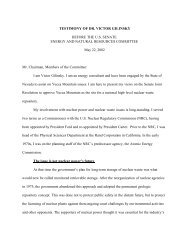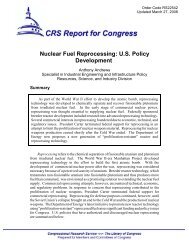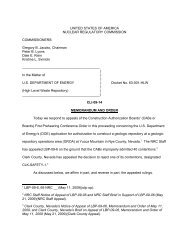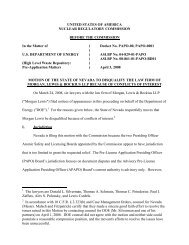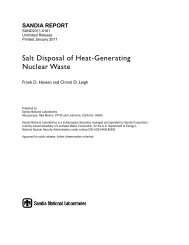The FuTure oF nuclear Fuel cycle - MIT Energy Initiative
The FuTure oF nuclear Fuel cycle - MIT Energy Initiative
The FuTure oF nuclear Fuel cycle - MIT Energy Initiative
You also want an ePaper? Increase the reach of your titles
YUMPU automatically turns print PDFs into web optimized ePapers that Google loves.
Table 8.1 A Selective History of International Nonproliferation <strong>Initiative</strong>s<br />
date initiative obJeCtiveS reSult<br />
1946 Baruch Plan u.S. proposal for intense oversight/<br />
international management of the civilian<br />
<strong>nuclear</strong> fuel <strong>cycle</strong><br />
1977 regional <strong>nuclear</strong> <strong>Fuel</strong><br />
<strong>cycle</strong> centers Study<br />
1975-1980 International <strong>nuclear</strong><br />
<strong>Fuel</strong> <strong>cycle</strong> evaluation<br />
1980–1987 committee on<br />
assurance of Supply<br />
2005 Multilateral approaches<br />
to the <strong>Fuel</strong> <strong>cycle</strong><br />
2006 nTI commits $50M for<br />
bank<br />
March<br />
2010<br />
Iaea and russia sign fuel<br />
bank agreement<br />
Study initiated by the Iaea to assess<br />
feasibility of establishing multinational<br />
fuel <strong>cycle</strong> facilities<br />
Study initiated by the u.S., conducted<br />
by the Iaea and other countries and<br />
orgs - intended to address the technical<br />
connections between fuel <strong>cycle</strong>s and<br />
weapons<br />
Iaea group addresses fuel banks and<br />
other supply strategies<br />
Iaea director General requests a report<br />
describing options and outlooks for<br />
Mnas<br />
drum up interest and matching funds for<br />
an leu bank<br />
establish a 120-MT leu stockpile in<br />
angarsk, russian; Iaea will control sales<br />
from the stockpile<br />
Vetoed by Soviets, who oppose facility<br />
inspections and giving up a u.n. veto on<br />
atomic matters<br />
Study finds that facilities are technically<br />
feasible, but too many challenges exist<br />
with tech transfer and providing security<br />
of supply<br />
Study finds that no technical solution<br />
is adequate; process contributes to<br />
rollback of <strong>nuclear</strong> supplier intentions<br />
to provide enrichment/reprocessing<br />
technology (e.g., Germany to Brazil)<br />
–<br />
Impact includes some increased interest<br />
in multinational fuel <strong>cycle</strong> arrangements<br />
Total $150M goal reached with Kuwait’s<br />
donation in March 2009<br />
russian authorities declare fuel bank<br />
operational in dec. 2010<br />
Clearly ANFSI and other fuel leasing approaches face some core challenges: security of supply,<br />
technological leadership, and political asymmetry.<br />
Security of supply: As already noted, international enrichment facilities would provide a<br />
degree of security of supply, but other approaches do so as well. Government-to-government<br />
assurances that fuel services will not be withheld for any reason other than a material violation<br />
of international non-proliferation commitments under the NPT and IAEA safeguards<br />
agreements would backstop commercial contracts. Even this will still need to be backed<br />
by a firm multilateral guarantee. In particular, the IAEA, with assistance from the Nuclear<br />
Threat <strong>Initiative</strong> and several countries, has established a fuel bank to address this. <strong>The</strong> IAEA<br />
should be authorized by the United Nations Security Council to assume a guarantor role<br />
through the fuel bank or fuel reserve, ensuring access to the contracted fuel services so long<br />
as nonproliferation commitments are observed. <strong>The</strong> Additional Protocol is important in this<br />
regard. <strong>The</strong> IAEA role could be extended with respect to <strong>nuclear</strong> fuel supply to a coordinating<br />
role analogous to that of the International <strong>Energy</strong> Agency in cases of supply disruption<br />
in the oil markets. Further, the long term contracts with fixed prices dispel price volatility<br />
concerns during the contract term.<br />
Technological leadership: Some countries argue that a fuel leasing arrangement combined<br />
with the commitment to abstain from enrichment and reprocessing will prevent development<br />
of indigenous technological leadership. <strong>The</strong>se arguments are not compelling for a ten<br />
year contract period – and probably not for periods beyond that. First, the technologies in<br />
question are not likely to form the basis of a major contribution to the national economy,<br />
especially given that fuel <strong>cycle</strong> evolution is not clear at the moment and fuel services represent<br />
a small part of the cost of <strong>nuclear</strong> power. <strong>The</strong> spillover effects of national investments<br />
chapter 8: <strong>Fuel</strong> <strong>cycle</strong>s and nonproliferation 119


